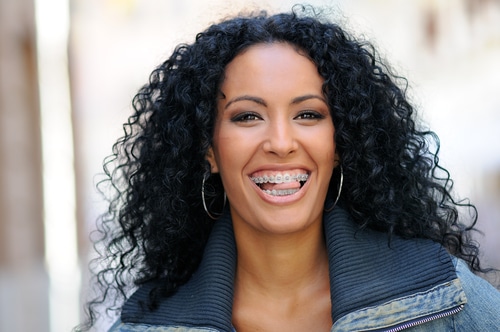Getting braces can be a nervous time for both adolescents and adults. It is a journey that starts off with a lot of changes all in a very short amount of time. For one, there is the addition of the braces themselves, which—if they are traditional braces—are usually visible and can make the wearer self conscious.
Second, braces can also affect the way the brace wearer speaks. Any foreign object or swelling in your mouth will alter the normal or usual motion that your tongue has been conditioned to move in, and so speech will be slightly different while all the moving parts adjust.
When is the Speech Change Most Noticeable?
When you first get your braces on it will take your tongue and mouth a little while to be accustomed to the new additions. Additionally, any time there is swelling in or around the mouth there will be a temporary change in how you form words, so when you have an adjustment you might notice a change in your speech.
The speech change will be more pronounced with some appliances than with others. Because of where they are positioned in your mouth, palatal expanders and retainers can interfere with sounds like “th”, “s” and “z.” Once the hardware is removed, you speech will return to normal quickly.
It Won’t Take Long
You are probably more aware of the difference than most of the people you will come into contact with. You have spent most of your life listening to your own speech so you will be more aware of any slight changes than anyone else.
Your tongue and facial structures are fantastic and quick at making the necessary changes to get your speech back on track. So after about two weeks things will more or less be back to normal. In some cases it will be as little as a couple of days.
Types of Braces
If you are hyper-sensitive to the way you speak or have to be conscious of it as part of your profession, Lingual Braces (installed on the back of the teeth) can be helpful in minimizing any speech differences. However, there will still be an adjustment period as your tongue becomes used to the braces and archwire.
Invisalign is another option too. The plastic trays used to adjust your teeth are more contoured to your teeth and so won’t affect speech as much. It is worth mentioning that not all patients are eligible for either of these types of braces and in some instances the orthodontist might not have the expertise to fit the lingual braces. The cost is usually higher for these appliances, too.
Sometimes, dental wax can be an effective way to “lubricate” the brackets that are attached to your teeth making speech a little easier.
There Are Positives
This temporary change in speech patterns shouldn’t be viewed as a downside to braces. Consider the bonuses of actively practicing how to enunciate. The differences in speech make a brace wearer more conscious of speech mechanics and they will gain a heightened awareness of the actual process of forming words.
Through focusing and practicing, brace wearers will learn to better enunciate and can end up being more accomplished speakers as a result.
Getting braces and aligning teeth can positively impact speech. Teeth are an integral part in speech, and misaligned teeth can result in significant speech impediments—from lisping to whistling. Proper orthodontic treatment and correctly aligned teeth can have a marked effect on those abnormal speech patterns.
To learn how we use state-of-the-art appliances and current techniques to customize your experience in braces or to schedule your free initial consultation, contact us. One of our professional staff will schedule you with one of our experienced doctors at one of our nine convenient locations around Baltimore.
We look forward to making you smile!



